This Month's Articles
REVIEWING
The No Luck Club
Getting to Happy
by Terry McMillan
Reviewed by Loretta H. Campbell
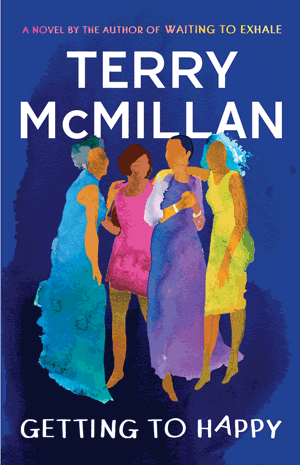
A crazy black woman shouted on a Brooklyn bus one day, "(Black) men lie!" This seems to be the opening theme in Terry McMillan's Getting to Happy, a variation on the romance genre made popular in her previous narratives, Waiting to Exhale and How Stella Got Her Groove Back. This novel is a follow-up on four Black middle-aged women, Gloria, Robin, Savannah, and Bernadine, from these previous books. Here they reconstruct their lives after various kinds of trauma, beginning with their troubled relationships with spouses, ex-spouses, midlife crises, and drug addiction.
The worst of these problems happens, in the case of Gloria, not because of her husband, Marvin, but to him. While running an errand, he becomes the victim of a drive-by shooting. Even in upscale Phoenix, Arizona, where these women live, Black people suffer from gang violence. His death echoes.....Read More
REVIEWING
House Divided
by Raul Ramos y Sanchez
Reviewed by Michael Carey
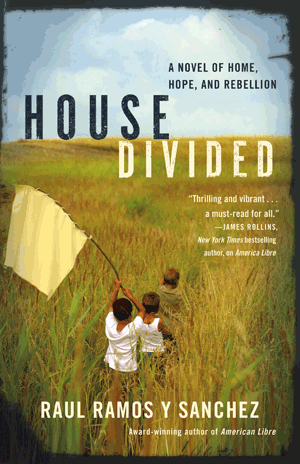
There are growing debates over immigration and reform pushing its way up Capitol Hill. Fear and an atmosphere of terror still linger over the U.S. since the 9/11 attacks. The combination of these issues has great potential for disastrous circumstances. As questionable legislature like the Arizona law known as SB1070 (which has opened the door to racial profiling) pass, the near future has many bleak possibilities.
A future in which the passing of more oppressive laws and growing violence has led to Hispanics being deemed second rate citizens, to be separated from the rest of the of the nation, is the setting for Raul Ramos y Sanchez’s new novel, House Divided. This is the second episode in a planned trilogy that began with the award winning America Libre, and picks up where it left off. American Libre, Spanish for ‘Free America,’ takes place in the second decade of the 21st century. Violence and fear, rising in the Hispanic communities around the U.S., have escalated and garnered attention in the global spotlight.
The first book introduces some of the main characters, including.....Read More
REVIEWING
By Nightfall
by Michael Cunningham
Reviewed by Sally Cobau
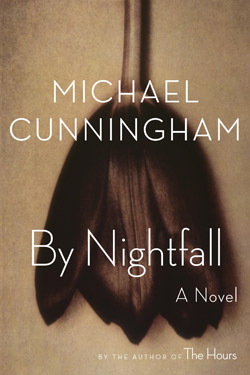
Michael Cunningham's latest book, By Nightfall, is both earthy and metaphysical. It's also funny—very funny. Achieving all three—writing great sex scenes, then providing comic relief, while posing serious questions about mortality, seems a daunting task.Yet Cunningham writes effortlessly, building a complex, multi-layered structure where desire, grief, and reflection create an enormous friction. The book is very satisfying to read, as ripe and fruity as a good wine, as the sophisticated protagonist, Peter Harris, would jokingly say, for he is the hero of the novel.
Peter is the successful owner of an art gallery in New York City. He is also the husband of the beautiful, successful Rebecca, and father to Bea, erstwhile daughter who (much to her parents' consternation) has left college to become a bartender. There are good meals to consume and foreign movies (such as 8 ½) to watch. All is good in the world (besides the quiet tick of dissatisfaction about the daughter). But all of this is about to change. (Of course, the reader senses that beneath this life of outward physical comfort lies uncertainty, boredom,.....Read More
A WRITER'S WORLD
"How to be a writer/mother/wife/daughter"
by Molly Moynahan
First, when your little boy decides to give you a new hairdo while weaving binder clips, white out, pencils and possibly a small stapler into the back of your head, let him. This may give you another ten minutes or so of working on your book. Recognize as soon as the call comes from the west coast radio show that your son will forget the “no talking game” and demand something complex from the refrigerator. You will describe your artistic beliefs while mixing Parmesan cheese into orzo. Then he will tell you he needs to sit on your lap and whisper things in your ear even though this sort of thing never happens anymore. Practice sounding authorial while your child mutters, “I love my momma” in your ear repeatedly.
Second, as he grows older, be prepared for his embarrassment and/or anger as his friends read your book. Wait for him to inform you that he read the first page and found it “gross”. This from the boy who listens to Rap songs that are basically one obscenity after another interrupted by a note or two of music. Never mind. Ask him if he’d like to discuss what he found objectionable. He will refuse and demand you buy him a new I-Pod to help him heal from the trauma of reading a sex scene written by his mom. Do not do this! Soon he will read your memoir, which describes such.....Read More
NOVEL
The African Gentleman
…and The Plot to Re-establish The New World Order
A Novel by Fred Beauford
Chapters 1-4
1
We sat on the seemingly endless boardwalk of The Beach, on the big island, quietly enjoying the late evening light and the comforting, late seasonal ocean breeze; the many people surrounding us, strolling slowly and serenely back and forth, most of whom were far younger than either of us--were also quietly enjoying the same, and final, warm days of summer.
In a casual, almost un-selfconscious movement, she used both of her hands to move the hair away from her face, and gently pushed it upward, revealing a finely sculptured, well-defined face that bore none of the sags and deep lines one would expect from a woman of her age.
She said that she was half Puerto Rican and half Italian. I could faintly detect the familiar Puerto Rican accent in her voice, but now with her hair pulled back, and her light blue eyes blazing with life, it was the northern Italian that I saw most clearly before me.
But who really was this woman named Rosy, sitting next.....Read More
Art Beat - DECEMBER 2010
Art Beat
By Lindsey Peckham

Park Avenue Armory
For a look at, into, through, and behind one of the most famous works of art in history, head over to the Park Avenue Armory, where Peter Greenaway’s vision of Da Vinci’s Last Supper is a phenomenal, multi-faceted look at the iconic work. It is a part of his Ten Classic Paintings Revisited series, where he attempts to create a dialogue “between 8,000 years of art and 112 years of cinema.” I would argue that.....Read More
REVIEWING
Love Conquers Naught?
Tiger Hills
by Sarita Mandanna
Reviewed by Janet Garber

For a romantic saga of colonial India, with its lush background sets, fragrant coffee plantations, and titillating jungle soundtrack, Tiger Hills has some unexpectedly bitter lessons to impart about the power of Love and stars the stunning Devi and the virile tiger-killing macho man, Machu,. Love, actually, is rather destructive: it wants what it wants; it thinks it excuses everything one does in its name. And what is its exact relation to real life, anyway?
Tiger Hills explores this conundrum. This surprisingly cynical theme catapults a sweet tale of lifelong love, both requited and not, past some melodramatic plot twists, quasi bodice-ripping.....Read More
SHORT STORY
You Must Remember This
by Jan Alexander
From Tara Mason’s Money Memoir. We bought a house. Nick said real estate was always going to appreciate. My husband with a brand new PhD in economics; he used the word “appreciate” that way. It was a farmhouse near Woodstock, with a robin’s-egg blue front porch and plenty of room for the kids we were going to have someday, including a detached garage with an upstairs apartment. We worked in New York but we could flee the city on weekends. We paid $10,000 more than the asking price to win the bidding war, but Nick said we’d get.....Read More
REVIEWING
Short
by Cortright McMeel
Reviewed by Jill Noel Shreve
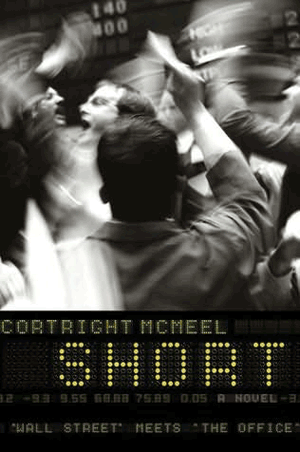
Gallagher, whose broad forehead and round, cherubic face made him resemble an overgrown toddler, sat at his desk, sipping a carton of chocolate milk. Andrews looked at his newest acquisition and furrowed his brow. Traders drank coffee, black.” In the opening scene of Cortright McMeel’s first novel, Short, McMeel introduces his audience to several high-powered energy traders at Allied Power, in Boston, including Gallagher, and Andrews. McMeel gives his audience an upfront, first-hand account of the trading floor—the comings and goings of cash, the ruthless behavior of employees, and the artistic strategies these traders must employ.
This novel, set in 2005, traces the lives of traders, brokers and executives—all folks who could use a pile of hundred dollar bills for kindling. McMeel focuses the novel on Gallagher, a new trader, Andrews, a veteran trader, and Jennings, the new head trader—a man everyone refers to as “The Ghost.....Read More
REVIEWING
Ledgers of History: William Faulkner, an Almost Forgotten Friendship and an Antebellum Plantation Diary
by Sally Wolff
Reviewed by Sarah Vogelsong
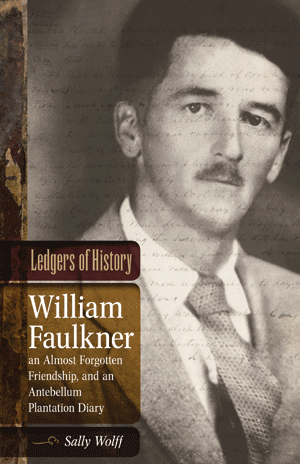
As the pace of our culture has accelerated, our literature has become preoccupied with questions of where we are going and what we are becoming. But a road is two-edged, having not just a destination but also a point of origin. These origins and our inability to leave them behind are primary concerns of William Faulkner’s literature. In Ledgers of History: William Faulkner, an Almost Forgotten Friendship and an Antebellum Plantation Diary, scholar Sally Wolff, a professor of Southern Literature at Emory University, digs into Faulkner’s own past, uncovering a significant period for the author when his life intersected with that of an old southern family in the town of Holly Springs, Mississippi.
Wolff has a strong background in Faulknerian studies, but this book grew out of an unexpected incident. While arranging the annual English department trip to Oxford, Mississippi, Wolff received an email from an Emory alumnus that read, “I can’t go on the trip, but I knew William Faulkner.”
The author of the message was Dr. Edgar Wiggin Francisco III, whose father, Edgar Francisco, Jr., was a close friend and hunting buddy of Faulkner’s. This friendship persisted for thirty years, peaking in the 1930s, when the younger Francisco was a child. Most of Dr. Francisco’s memories of the relationship stem from the periodt.....Read More

